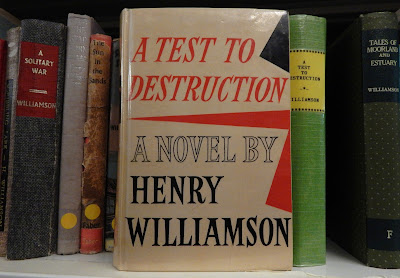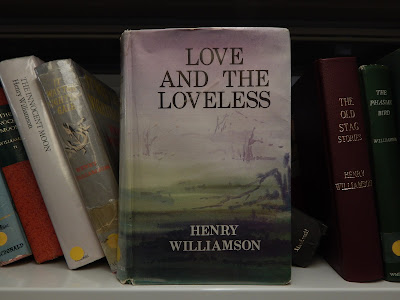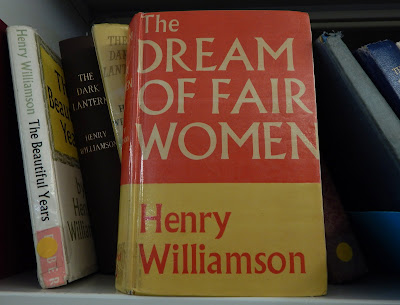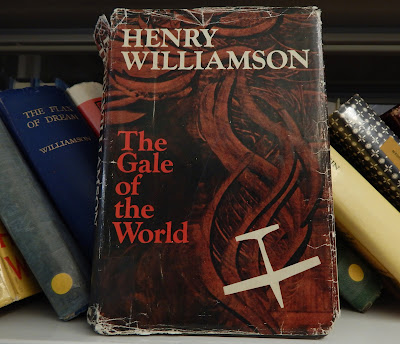Henry Williamson's Long Century
Here’s a guest post from friend of the library Karen Hedges (whose website, including blog, you can find here). Karen works tirelessly to promote and further the educational work of the Norman Lockyer observatory above Sidmouth, which featured in a previous post on Norman and Lady Lockyer. Karen has also put on a number of excellent illustrated science talks in St Thomas Library, with a particular focus on the Moon. Here, however, she focusses her attention on a major saga by a Devon-based author which she got swept up in, which takes its protagonist through the turbulent history of the first half of the twentieth century. As Karen says, it's a real reading marathon, but one which she has completed. So here she is, reporting back from the finishing line for Sleuthing in the Stacks.
Book Review of Henry Williamson’s Chronicle of Ancient Sunlight
This ambitious project has taken me a year to complete, and then not entirely as I skipped a couple of volumes in order to complete the reading and review. It was through Jez at Exeter Central Library that I came across this series and it deserves much wider recognition.
Here it is:
Book Review of Henry Williamson’s series entitled ‘A chronicle of ancient sunlight’ – in a nutshell, this series is something I wish I had discovered earlier.
Exeter Library had a display of books of local interest from the Stack and I was intrigued by ‘The Dark Lantern’ by Henry Williamson. I had not known he had written books other than Tarka and Salar. As I turned the pages, I was transfixed by the prose – not a word wasted, every word, every phrase to be savoured. Why had I not known of these books? The old books have proved an unexpected delight and convey the huge social change in such an interesting and evocative way. There was even a Henry Williamson Society. One day perhaps I may join. His books come across as semi-autobiographical and describe Kent and Devon, both areas well known to me. It took me a long time to read the first book, or rather savour it as I was entranced by the prose, the insights into personal behaviour and the general descriptions of life, nature and places. The characters spring from the book and the narration encourages sympathy for the main characters, while you want to scream at each of them and tell them to speak honestly to each other. His descriptions of human behaviour emulate the detail of his animal books. The descriptions of the minutiae of life are detailed yet never boring. A treasure trove indeed as there are 8 in the series.
In ‘A chronicle of ancient sunlight’, Henry Williamson treats us to a wonderful journey through the adventures and misadventures of Richard Maddison and his family against a background of stupendous social change. The detail is on a par with Dickens but, to my mind, his writing is more tightly written with not a word too many. The characters are totally absorbing; and relationships and growing up are explored in such a way that you find yourself nodding in agreement or with sympathy for the character. Sheer brilliance.
The Dark Lantern
A young man’s view of the world with late Victorian constraints. Williamson evokes the pain of love and the intricacies of relationships so beautifully and with such empathy. This was a hugely enjoyable read.
Donkey Boy
The narrative captures the thoughts and feelings of a young boy, or indeed girl, with a freshness and accuracy that is intimate and perceptive.
The Young Philip Maddison
The narrative moves to Richard’s son, Philip, and shows the similarities between father and son. Imperceptibly the narration moves from that of a child to a young adult, conveying the inner life of a child’s mind.
How Dear is Life
A gritty exploration of life on the cusp of the First World War, with the excitement of going to war, the worry of war affecting an already struggling Britain. Very dark tone, different from the others so far. Descriptions of scenes my grandfather would have seen. The narrative has a very different feel from the previous books I have read. It is a dark book and conveys the futility of fighting and the contradiction of fighting for peace. There is very much a pacifist strand running through this book.
A Fox under my Cloak
Immediately we are taken onto the battlefields of the Somme and, along with Philip, feel that the old days of the scouts are such a long time ago. I am finding the blow-by-blow account of the war a bit heavy going. The descriptions of life in the trenches and the reality of war make for grim reading and I have to confess to skim reading some of this book. Williamson certainly makes you feel the horrors of war and Philip’s distress. Not an easy read.
The Golden Virgin
I had put off reading this book but what a mistake…the first few pages were a delight with the narrative voice changing to Philip’s sister, with her views on past events. I was struck by a reference on page 38 to the ‘great chemical concern of Brunner, Mond, and Company’ by which it was apparent how thorough was Williamson’s research. As a member of the Norman Lockyer Observatory, I had recently learned that the Mond Dome was named in honour of Robert Mond, a friend of Lockyer’s and founder of ICI. The name jumped out at me, and I thought, “I know about this!”.
The detail of tunnelling and the hardships of the war in the Somme are graphic. Within this volume are hints of anti-war feeling and mention of conscientious objectors.
On page 221 Williamson evocatively writes ‘the roll of the Earth from darkness into light was brief’, which is an astronomically accurate depiction of the changing seasons on Earth.
During his descriptions of the Battle of the Somme, Williamson has a touching scene in which a British priest shows compassion for an injured Bavarian. I don’t think many would disagree about the waste and destruction of war.
Williamson is amazingly perceptive: I read the sentence, ‘It was sad that the world seen from the safety of bed had already vanished.’ with a degree of empathy and understanding as I had been confined to bed for a few weeks following an operation on my foot. It had been relaxing and refreshing to have a break from everyday life. Interestingly, that experience definitely helped with the confinements of lockdown.
His writing is vibrant and compelling, albeit on the particularly gloomier side in this volume when he suggests “we’re all on a voyage of death”. This volume has really established the story in the 20th century with references to the old Victorian ways with which the story began. Imperceptibly, the narrative changed to the second of three generations in this chronicle. There are references to the ancient sunlight which is the over-arching title of the series. This book has strong overtones of longing for lost times. A haunting volume.
Love and the Loveless
The relentless story of the Somme continues. Philip shows his sensitive and caring side with respect to ‘his’ men and the ‘donks’. The graphic descriptions of what the horses and mules went through resonate with me as my grandfather was in the Royal Horse Artillery in the Somme.
And the awesome phrases continue…”That night, under the tarpaulin roof of the mess, the levels of initialled whiskey bottles were lowered.” What a gem!
Interspersed amongst the detailed minutiae of life on the battlefield, are glimpses of Philip’s longing for home, for the country, for life as it was before. He continues to notice the natural world, and the changing seasons. He also notices that women are doing more and more work such as on buses and canals.
There is mention of a United States of Europe. Comparison is made with the fighting between Greek states.
And still the brilliant writing continues…”Giant finger-flashes were playing the piano of hell behind the distant Gheluvelt plateau.” And, just when you think it can’t get any bleaker…the phrase “even the worms were dead” appears as the descriptions of the Somme continue in their detailed bleakness.
I notice that my reviews so far have become longer in line with the increasing complexity of the novels and my increasing admiration for Henry Williamson.
For the sake of actually completing a review of this series, I shall concentrate on three more books in the series which seem to cover key moments in Philip’s life and in history. At a later date, I envisage returning to the series to read those books I have left out. (Author’s note: I started reading the series in August 2022 and am writing this in August 2023 and feel I have completed a marathon!)
The Phoenix Generation
Lots of observations about the changing social structure and an interesting comment about encouraging people to retire at 60 in order to release jobs for those who need them most…! This book has a different feel about it as well as containing hints of stories to come, for instance, Salar the Salmon. I tried reading that book but found the descriptions of the salmon too heartbreaking. I will have another go one day!
And so, Williamson’s writing genius continues with phrases such as “split scones daubed with cream and jam.”
Halfway through and the tone is becoming darker with political overtones and mention of Hitler…I am disturbed by the main character’s tendency towards having affairs which doesn’t fit with his earlier lifestyle. I so wish I had discovered this series earlier in life. However, I am keen to finish most of the series in order to complete a review for Exeter Library.
A Solitary War
Somewhat disturbingly, this book contains a dedication to Diana and Oswald Mosley.
But, oh dear, I was hoping to skim through this one in order to help finish the project…Williamson continues the high standard of prose and has wowed me on the first page already with his insightful observations of behaviour and speech in children, and the situation in Europe.
‘”I don’t want to go to beastly old school either, so I think I’ll leave, too,” cried David. And, Jonathan, the youngest, tried to repeat what David had said, but got confused, and exploded in a sudden shout.’
About Europe, he writes that Britain’s policy had been to ‘divide and rule’, to prevent any nation trying to create a United States of Europe. This echoes what I learned during my studies of European economic and political geography and is pertinent particularly at the moment with the resignation of Boris Johnson, who oversaw the department of Britain from ‘Europe’ in 2019/2020. There is still much discussion over the fallout from Brexit.
And, this book covers the beginning of the second world war. A book to read carefully!
There is a great sense of war-weariness and comments regarding the state of the economy, a united Europe, and the phoney war. Hints of Jewish issues, Hitler, and feminism. There are many references to the overarching theme of ancient light and shadows. As an amateur astronomer, I was taken by his descriptions of the night sky, particularly the detailed directions to Polaris (“6 lengths from the coulter of the Plough”). Although a member of the Imperial Socialist Party, it is difficult to ascertain where his true loyalties actually lie; Phillip’s main grievance is against the financial institutions. He is pro-European and pro-Hitler, but as the war continues, he describes Hitler as being forced to act, with changes to his personality. Farming is dear to his heart and Phillip is concerned with all farming issues, and the crisis the war brings to it.
*****
Finally, after a week’s holiday in Scotland, I read the final book in the chronicle, with a feeling of regret that I had not discovered these books earlier in my life.
The Gale of the World
Williamson’s magnificent writing shows no sign of letting up with such wonderful phrases as “summer clouds smouldering in an Atlantic sunset” and “Antares, most passionate of summer stars, blushes above the southern horizon”(Antares is the red alpha star in Scorpius).
And again, this wonderful gem, ‘Trays of self-cremating cigarette stubs,’. Awesome.
In this book, we return to the first character, Richard, as he lies in a nursing home, old and incontinent, still full of dreams and distant from his own family. The title is a reference to the turbulent war years and massive social change as Philip remarks to his friend that “all of us now living have been ‘caught in the gale of the world’”…as indeed have all of us that have lived through the Pandemic. There is a fair amount of retrospective thinking as Philip comes to terms with the death of his father and the effect his family and upbringing have had on his personality. And yet, there are gems of light and hope in this volume, such as the phrase, “True love is like sunlight; it casts no shadow on the soul.”
Disturbingly, this book also contains a reference to a dominant concern of our times, that of climate change. Williamson notes that “The old British weather is passing away with the Empire…the polar ice-cap is melting…”.
Throughout this book are sprinkled references to light, sunlight, and lanterns. The tone is wistful and there is a superb reference to people and places of times past with the magnificent phrase, “…for that they were of Time lost, yet waiting to be brought back from ancient sunlight.” And, almost imperceptibly, in the background there continue to be mentions of the massive social changes taking place.
*****
I include here, as a finale to my review, a quote from the Henry Williamson Society’s website:
There are so many threads drawn together within this final novel, and so many strange scenarios presented within the plot, that the reader can feel an overwhelming confusion. But once the essentials are grasped the complexities dissolve into clearer pattern, and as the looming sense of doom resolves itself by coming full circle, creating a perfect whole, we are left with a powerful sense of satisfaction that all has ended well.
*****
Throughout all of the books, Williamson’s analogies are second to none and too prolific to mention many. For example, ‘guns, painted in colours of decaying cabbages…’, the waning moon as a ‘decaying orb’.
And so, I end my review of most of the books in this amazing series which has taken me on an intense journey from the end of the 19th century through to the war years of the 20th. I really wish I had discovered this series sooner; I think it would take several decades to truly appreciate and understand it all. Having now read most of the series, I want to return to the beginning and read the whole again with greater awareness. Henry Williamson’s writing is awesome, and he deserves wider recognition.


















Comments
Post a Comment